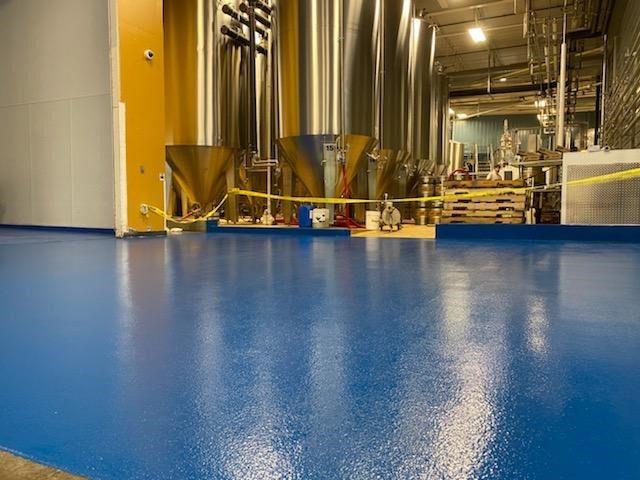Food & Beverage Concrete Flooring

Industries
Food & Beverage
Specialized Solutions for:
- Processing Areas
- Mechanical Rooms
- Commercial Kitchens
- Loading Docks
- Dining Areas
- Brew Rooms
- Wineries
- Freezers/Refrigeration
- Offices
- Restrooms
- Bakeries
- Traffic Aisles
- Packaging Areas
- Food Prep Areas
- Bar Areas
Flooring Considerations for the Food & Beverage Industry:
Regulatory Needs for the Food and Beverage Industry:
The Occupational Safety and Health Administration (OSHA) requires flooring to be clean, dry, and free of hazards to prevent injuries. Floors should be kept clean, have proper drainage to avoid standing water, be installed to a smooth finish, and include coving along the floor-to-wall juncture.
The United States Department of Agriculture (USDA) notes that seamless floors are required and should be durable, easily cleanable, and impervious to moisture. They must also be sloped to reduce standing water, be able to withstand regular cleanings, and actively inhibit the growth of bacteria and mold through their seamless design and use of cove basing. Certain facilities need additional antimicrobial additives to meet industry standards.
The Food and Drug Administration (FDA) notes that one of its primary requirements is that the flooring in the food industry be non-porous to minimize the risk of contamination through trapped dirt, moisture, or food particles. Non-porous floors are also more resistant to stains and spills while being easier to clean. FDA-approved floors must also be resistant to impact, abrasion, chemicals, and temperature changes.
All of these requirements are designed to prevent cross-contamination and maintain a safe and clean food production environment.
Bare concrete flooring fails to meet the demands of the food and beverage industry, and it also lacks the polished, appealing look that makes a lasting impression on customers. Restaurants, bars, and production areas, in particular, require stylish and durable flooring that enhances their brand image and reputation. These floors are more than just functional—they represent your establishment’s commitment to quality, cleanliness, and safety.
Resinous flooring meets all the unique requirements of the food and beverage industry. Its slip-resistant and antimicrobial options offer a clean, attractive, and safe surface for employees and customers alike, even in the event of spills. By elevating both the aesthetic and the safety standards of your space, these floors can enhance your business environment and improve overall operations.
An Advantage Coating Flooring Specialist can provide a complimentary facility evaluation and help design a flooring solution that refreshes your existing surfaces, elevating both the design and functionality of your space to new levels.
Related Industries

High-performance floor coatings that are resistant to chemicals, impacts and abrasion.

Durable floor coatings that are safe, attractive and easy to maintain.

Floor coatings that are safe, hygienic and comfortable under foot.




